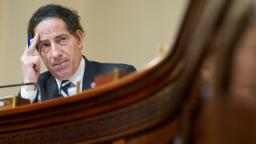[ad_1]

CNN
—
Rep. Jamie Raskin, a member of the House January 6 select committee, said reforming the Electoral College to ensure the presidential winner reflects the outcome of the popular vote would be the next step to safeguard democracy.
“The Electoral College now – which has given us five popular-vote losers as president in our history, twice in this century alone – has become a danger, not just to democracy, but to the American people. It was a danger on January 6,” the Maryland Democrat said in an interview with Margaret Brennan on CBS’ “Face the Nation” that aired Sunday. “There are so many curving byways and nooks and crannies in the Electoral College, that there are opportunities for a lot of strategic mischief. We should elect the president the way we elect governors, senators, mayors, representatives, everybody else. Whoever gets the most votes wins.”
“The truth is that we need to be continually renovating and improving our institutions,” Raskin said, later noting that he supports the National Popular Vote Interstate Compact, which represents a pledge made by certain states and the District of Columbia to award their electoral votes to whichever candidate wins the popular vote nationwide.
Under the US Constitution, Americans don’t select their president directly. They vote for their state’s electors, who are then expected to carry out the will of the voters when they vote for president and vice president.
Democrats Al Gore in 2000 and Hillary Clinton in 2016 both won the national popular vote in their races but lost the Electoral College vote count. Other presidential nominees who lost after winning the popular vote included Andrew Jackson (1824), Samuel Tilden (1876) and Grover Cleveland (1888).
“The framers [of the Constitution] were great, and they were patriots, but they didn’t have the benefit of the experience that we have lived, and we know that the Electoral College doesn’t fit anymore,” Raskin said.
Included in the sweeping spending bill that Congress passed last week was a measure aimed at making it harder to overturn a certified presidential election. Raskin described the move, which would reform the 1887 Electoral Count Act, as “necessary” and “the very least we can do and we must do.”
“But it’s not remotely sufficient,” he said. “We spend hundreds of millions of dollars every year exporting American democracy to other countries, and the one thing they never come back to us with is the idea that, ‘Oh, that Electoral College thing you have, that’s so great, we think we’ll adopt that too.’”
Raskin’s remarks come just days after the select committee – which has investigated the January 6, 2021, attack on the US Capitol – issued its final report, a comprehensive overview of the bipartisan panel’s findings on how former President Donald Trump and his allies sought to overturn the 2020 presidential election. In a symbolic move, the committee in its last public meeting referred Trump to the Justice Department on four criminal charges.
Raskin said the unprecedented referrals were necessary because of the “magnitude of the attack on democracy” on January 6. He also warned of a future coup attempt.
Raskin talked about security threats members of Congress face amid rising partisan tensions.
“There’s very dangerous rhetoric going on out there that’s a real break from everything we’ve known in our lifetimes,” he said.
“What it means to live in a democracy with basic civic respect is that people can disagree without resorting to violence. But the internet has played a negative role, especially for the right wing, the extreme right, which now engages in very dangerous hyperbolic rhetoric that exposes people to danger.”
Source link